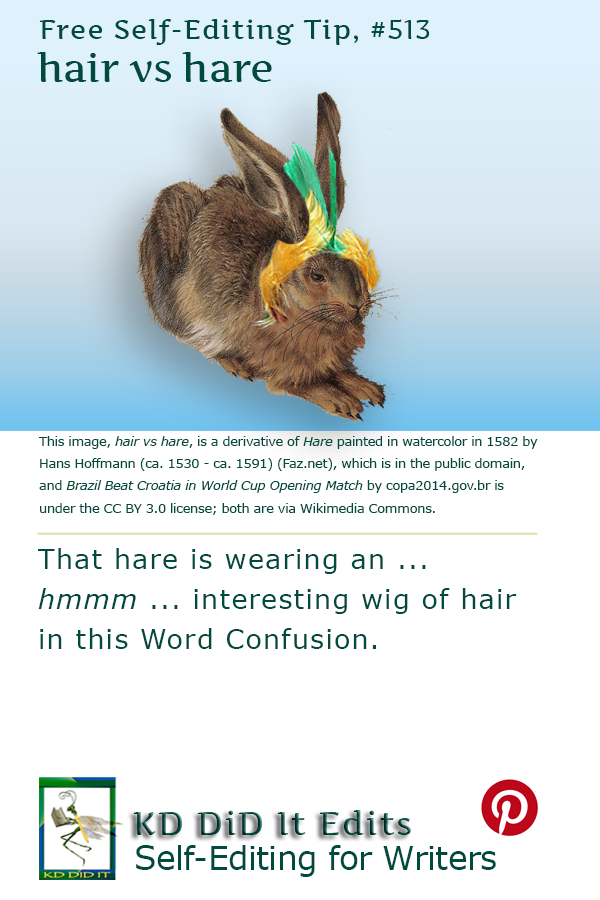Revised as of
25 Nov 2022
It was coming across the phrase he had a wild hare . . . that got me wondering. Is it wild hair or wild hare? Hmmm, does the wild add to the fact that hair and hare are heterographs?
The Internet is awash in both versions, and both do make sense . . . with a slight distinction.
The Wild Hair
The wild hair was the combined form I’ve always known with . . . up his ass being the textual ellipsis. It indicates that the character was irritated, in a frenzy of activity, or makes a sudden or rash decision.
Just think of how twitchy you get, how itchy and irritated you feel after a haircut with those, ahem, wild hairs clinging to your neck!
The Wild Hare
The wild hare stays the course in its definition of the chase and implies a crazed zigzag path as one heads to one’s goal.
You may also be interested in “Fir versus Hair” or marginally interested in “Fir versus Fur“.
Word Confusions . . .
. . . started as my way of dealing with a professional frustration with properly spelled words that were out of context in manuscripts I was editing as well as books I was reviewing. It evolved into a sharing of information with y’all. I’m hoping you’ll share with us words that have been a bête noire for you from either end.
If you found this post on “Hair versus Hare” interesting, consider tweeting it to your friends. Subscribe to KD Did It, if you’d like to track this post for future updates.
| Hair | Hare |
|---|---|

Wild and Red Hair Day by Eddy Van 3000 was originally uploaded on flickr and is under the CC BY-SA 2.0 license, via Wikimedia Commons. |

Brown Hare (Lepus europaeus) is Ken Billington’s own work under the CC BY-SA 3.0 license, via Wikimedia Commons. |
| Part of Grammar: | |
| Noun
Plural: hairs |
Noun; Verb, intransitive
Plural for the noun: hare, hares Third person present verb: hares |
Any of the fine threadlike strands growing from the skin of humans, mammals, and some other animals
Cloth made of hair from animals, as camel and alpaca A very small amount, degree, measure, magnitude, etc.
[Astronomy; use an initial cap] The constellation Lepus the Hare |
Noun: A fast-running, long-eared mammal that resembles a large rabbit, having long hind legs and occurring typically in grassland or open woodland
Verb, intransitive: |
| Examples: | |
| His magic takes him a hair above the competition.
Can you make me an appointment at the hair salon? You can’t miss her. She’s a woman with shoulder-length fair hair. Gawd, he makes my hair stand on end! “I could really use a hair of the dog,” she moaned. C’mon, baby, let your hair down. That George. Never a hair out of place. The old woman didn’t turn a hair; she just sat quietly rocking. Why my dad thought eating burned toast and it putting hair on my chest was a good idea, I’ll never understand. Jesus, you’re always splitting hairs! I love your camelhair coat, Jean! He lost the race by a hair. |
Noun: Ideally, politicians should try to run with the hare and hunt with the hounds, if you want to make any progress. A leveret is a young hare. The dogs were raced after an artificial hare which was drawn, by means of a windlass, along a rail laid in the grass over a straight track of 400 yards Game). Lepus, the Hare, was one of the animals that the great hunter Orion most delighted in pursuing. Hares are larger than rabbits. The March Hare was friends with the White Rabbit, the Dormouse, the Mad Hatter, and of course, Alice. Verb, intransitive: She went haring off like her skirt was on fire. |
| Derivatives: | |
| Adjective: -haired, hair-covered, hair-raising, hairier, hairiest, hairless, hairlike, hairsplitting, hairy Adverb: hairily Noun: hair’s breadth, hair-raiser, hairball, hairband, hairbreadth, hairbrush, haircare, haircloth, hairdo, hairdresser, hairdressing, hairgrip, hairiness, hairline, hairnet, hairpiece, hairpin, hairslide, hairsplitting, hairspray, hairspring, hairstreak, hairstylist, hairweaving Verb, transitive: dehair |
Adjective: harelike |
| History of the Word: | |
| Old English hær is of Germanic origin and related to the Dutch haar and the German Haar. | Old English hara is of Germanic origin and related to the Dutch haas and the German Hase. |
C’mon, get it out of your system, bitch, whine, moan . . . which words are your pet peeves? Also, please note that I try to be as accurate as I can, but mistakes happen or I miss something. Email me if you find errors, so I can fix them . . . and we’ll all benefit!
Satisfy your curiosity about other Word Confusions on its homepage or more generally explore the index of self-editing posts. You may also want to explore Book Layout & Formatting Ideas, Formatting Tips, Grammar Explanations, Linguistics, Publishing Tips, the Properly Punctuated, Writing Ideas and Resources, and Working Your Website.
Resources for Hair versus Hare
Apple Dictionary.com
“Game, Gun, Metal/Greyhound-Racing.” Encyclopedia Britannica. V 10. P 2. <http://gluedideas.com/Encyclopedia-Britannica-Volume-10-Part-2-Game-Gun-Metal/Greyhound-Racing.html>
Pinterest Photo Credits:
Hare was painted in watercolor in 1582 by Hans Hoffmann (ca. 1530–1591) (Faz.net) and is in the public domain, and Brazil Beat Croatia in World Cup Opening Match by copa2014.gov.br is under the CC BY 3.0 license; both are via Wikimedia Commons.


